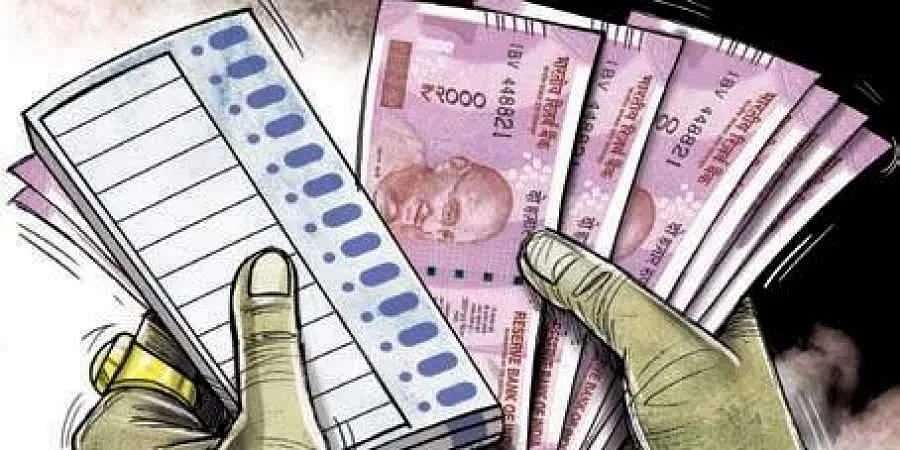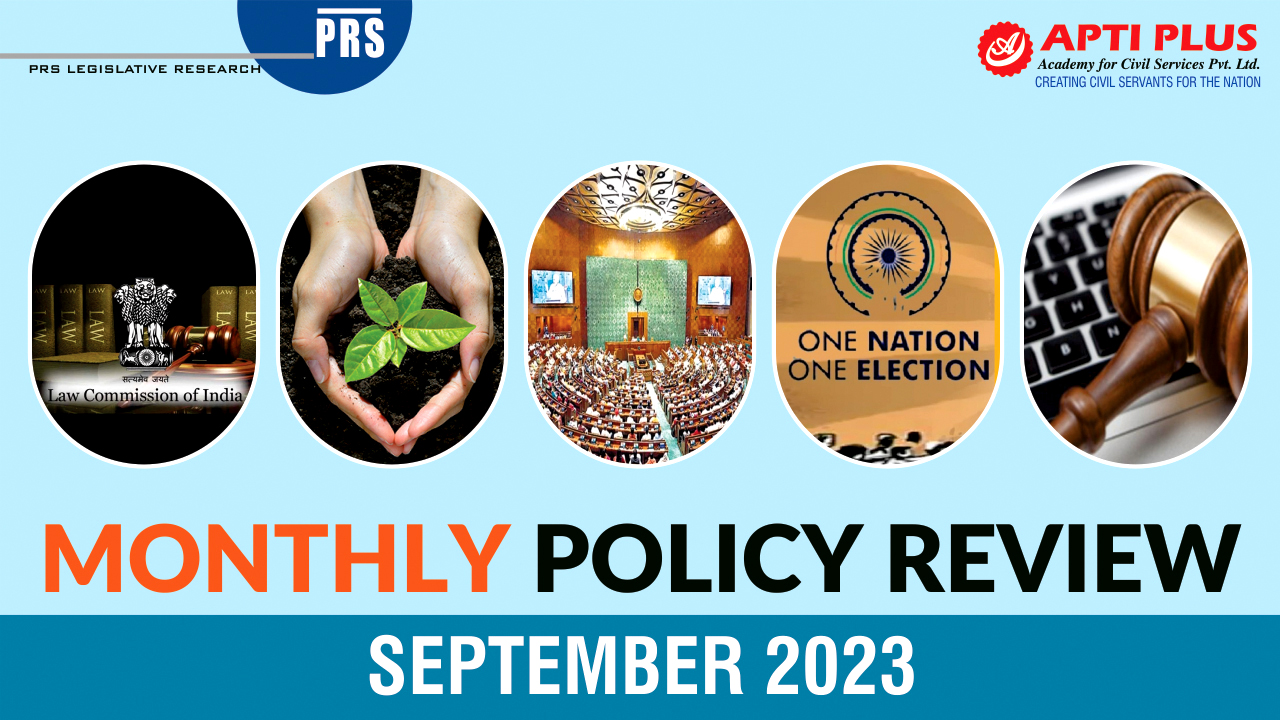
Copyright infringement not intended
Picture Courtesy: www.newindianexpress.com
Context: Studies consistently show a strong correlation between political funding, particularly from wealthy candidates and significant campaign contributions, and electoral outcomes, indicating the influence of money on elections.
Key Highlights
Electoral Bonds Distribution
- The unequal distribution of electoral bonds, with the ruling party receiving a substantial majority, raises concerns about fairness and transparency in political funding.
- When one party receives a significantly larger share of funding, it can have a disproportionate advantage in conducting election campaigns, influencing voters, and securing electoral victories. This concentration of funds might create an uneven playing field, potentially undermining the democratic process.
Wealth Disparities in Candidates
- Candidates from wealthier backgrounds, especially those affiliated with competitive parties, are more likely to win elections. This wealth disparity can limit opportunities for candidates from less affluent backgrounds.
- Wealthier candidates often have more resources to invest in campaigns, advertisements, and voter outreach efforts. This financial advantage can lead to increased visibility and voter influence, potentially sidelining candidates who lack such resources. This scenario can impact the diversity and representativeness of elected officials.
Role of Money in Elections
- Significant financial resources, including political donations and campaign spending, strongly influence votes cast for major parties.
- Money plays a pivotal role in shaping public opinion. Parties and candidates with ample funding can run extensive and persuasive campaigns, reaching a wider audience. This increased exposure can sway voter sentiments, potentially impacting election outcomes.
- Financial resources are closely linked to the ability to influence public opinion and secure electoral victories.
Concerns Raised by Authorities
- Concerns were raised by authorities about the lack of transparency and potential misuse of electoral bonds, including selective anonymity and the possibility of shell companies channelling black money.
- Authorities like the Supreme Court, the Reserve Bank of India, and the Election Commission of India play a crucial role in upholding the integrity of the electoral process. Their concerns highlight potential loopholes and challenges in the current political funding system.
- Selective anonymity can lead to questions about fairness, while the use of shell companies raises concerns about illegal and untraceable funds entering the political arena, undermining the transparency goals of the system.
Legislative Changes
- Amendments to various laws alongside the introduction of electoral bonds potentially increase the role of political funding in shaping electoral outcomes.
- Legislative changes can directly impact the rules and regulations governing political funding. Amendments to key laws indicate a shift in policy, potentially facilitating the flow of funds into the political system.
- The changes can influence how political parties and candidates raise and utilize funds, shaping the dynamics of electoral campaigns and, consequently, election results.
Relationship between Political Funding and Electoral Outcomes
- Political funding is the process of raising and spending money for political campaigns, parties and candidates. It is an essential aspect of democracy, as it enables political actors to communicate their messages, mobilize supporters and compete for votes. However, political funding also raises several challenges and concerns, such as its sources, transparency, regulation and impact on electoral outcomes.
- The modes of political funding in India include cash transactions, cheques or demand drafts, online transfers or payments, electoral trusts and electoral bonds.
- Cash transactions are direct exchanges of money between donors and recipients.
- Cheques or demand drafts are written orders to pay a specified amount of money from one account to another.
- Online transfers or payments are electronic transfers of money from one account to another using Internet banking or digital wallets.
- Electoral trusts are registered entities that collect donations from various sources and distribute them to eligible parties. Electoral bonds are interest-free bearer instruments that can be purchased from designated banks and redeemed by registered parties.
Why is political funding important for electoral outcomes?
- Political funding can influence electoral outcomes in various ways.
- It can affect the supply of candidates and parties, as it determines who can afford to contest elections and how many resources they can deploy.
- It can affect the demand of voters, as it shapes their information, preferences and choices.
- It can affect the quality of governance, as it creates incentives and constraints for elected representatives and policymakers.
- According to some studies, there is a positive relationship between political funding and electoral outcomes in India, meaning that richer candidates and parties are more likely to win elections.
How does political funding affect electoral outcomes in India?
- Political funding can have both positive and negative impacts on electoral outcomes in India.
- On the positive side, it can enhance political participation, representation and accountability, by enabling more candidates and parties to enter the electoral arena, increasing voter awareness and interest, and providing feedback mechanisms for citizens.
- On the negative side, it can undermine political equality, competition and integrity, by creating barriers to entry for less wealthy candidates and parties, distorting voter preferences and choices, and facilitating corruption and malpractices.
Steps taken to regulate political funding
- The Representation of the People Act (RPA), 1951 lays down the rules for conducting elections in India, including the disclosure of income and expenditure by candidates and parties.
- The Income Tax Act (ITA), 1961 provides tax benefits for donors and recipients of political funding, such as exemption from income tax for donations up to a certain limit and deduction from taxable income for donations above that limit.
- The Companies Act (CA), 2013 regulates corporate donations to political parties, such as imposing a ceiling of 7.5% of average net profits for donations by companies in any financial year.
- The Foreign Contribution (Regulation) Act (FCRA), 2010 prohibits foreign contributions to political parties or candidates, except from Indian citizens living abroad or foreign companies with less than 50% foreign shareholding.
- The Election Commission of India (ECI), an autonomous constitutional body oversees the conduct of elections in India, including monitoring and enforcing the compliance of candidates and parties with the rules of political funding.
- The Election Expenditure Monitoring (EEM) System, a mechanism established by the ECI to track and curb the illegal use of money in elections, such as setting expenditure limits for candidates and parties, deploying expenditure observers and flying squads, conducting raids and seizures, imposing penalties and disqualifications.
- The Electoral Trusts Scheme (ETS) was introduced by the government to encourage transparency and accountability in corporate donations to political parties, by allowing only registered electoral trusts to collect and distribute donations to eligible parties.
- The Electoral Bond Scheme (EBS) was introduced by the government to facilitate anonymous donations to political parties, by allowing only registered parties to receive donations through electoral bonds issued by designated banks.

What are the problems with political funding in India?
|
Lack of transparency
|
●There is a lack of transparency in the sources and modes of political funding in India, as many donations are made in cash or through anonymous instruments like electoral bonds, which do not reveal the identity of the donors or the recipients.
●It is difficult to track the flow of money in politics and to hold the donors and recipients accountable for their actions.
|
|
Disproportionate influence
|
●There is a disproportionate influence of moneyed interest groups on political parties and candidates, as they can use their financial power to sway electoral outcomes in their favour.
●It can compromise the independence and integrity of political actors and undermine the public interest and welfare.
|
|
Unfair competition
|
●There is an unfair competition among political parties and candidates, as they face unequal access to resources and opportunities for political funding.
●It can create entry barriers for less wealthy or new entrants and distort the level playing field for electoral contests.
|
|
Corruption and malpractices
|
●There is a risk of corruption and malpractices in political funding, as it can create quid pro quo arrangements between donors and recipients, whereby donors expect favours or benefits from recipients in return for their donations.
●It can lead to policy capture, rent-seeking, cronyism and nepotism in governance.
|
Way forward to improve political funding in India
Enhancing transparency
- There is a need to enhance transparency in the sources and modes of political funding in India, by requiring full disclosure of all donations and expenditures by candidates and parties, irrespective of their amount or mode.
- This can be done by strengthening the existing laws and institutions, and by introducing new mechanisms, such as real-time reporting, online filing, independent auditing and public scrutiny.
Reducing influence
- There is a need to reduce the influence of moneyed interest groups on political parties and candidates, by imposing limits or bans on certain types of donations or donors, such as cash donations, corporate donations or foreign donations.
- It can be done by amending the existing laws and schemes, and by introducing new regulations, such as public interest litigation, citizen audits and social audits.
Promoting competition
- There is a need to promote fair competition among political parties and candidates, by providing equal access to resources and opportunities for political funding.
- It can be done by introducing public funding of elections, either partially or fully, based on certain criteria, such as vote share, seat share or performance.
- It can also be done by creating a level playing field for electoral contests, such as ensuring media access, voter education and campaign regulation.
Preventing corruption
- There is a need to prevent corruption and malpractices in political funding, by enforcing strict accountability and penalties for violations of rules or norms.
- It can be done by empowering the existing institutions and mechanisms, and by creating new institutions and mechanisms, such as ombudsman, anti-corruption agencies and whistleblower protection.

Conclusion
- Political funding is a crucial aspect of democracy that affects electoral outcomes in various ways. India has taken several steps to regulate political funding over the years but still faces many challenges and problems with its current system. To improve political funding in India, there is a need to enhance transparency reduce influence promote competition prevent corruption
Must Read Articles:
Electoral Bonds: https://www.iasgyan.in/daily-current-affairs/electoral-bonds-21-2
Electoral Bonds and Electoral Trusts: https://www.iasgyan.in/daily-current-affairs/electoral-bonds-and-electoral-trusts
|
PRACTICE QUESTION
Q. How does the influence of political funding impact electoral outcomes, and what are the potential consequences for democracy and representation in countries with varying levels of campaign finance regulations?
|




